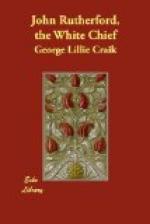Rutherford states that during his long residence he became very expert, after the manner of the natives, in catching birds with a noosed string, and that he has thus caught thousands of ground parrots with a line about fifty feet long. The most remarkable bird is one to which Cook’s people gave the name of the mocking-bird, from the extraordinary variety of its notes.[AQ] There is also another which was called by the English the poe, or poi bird, from a little tuft of white curled feathers which it has under its throat, and which seemed to them to resemble certain white flowers worn as ornaments in the ears by the people of Otaheite, and known there by a similar name. This bird is also remarkable both for the beauty of its plumage and the sweetness of its note. Its power of song is the more remarkable as it belongs to the class of birds which feed on honey, whose notes are generally not melodious.[AR]
The enchanting music of the woods of New Zealand is dwelt upon with rapture by all who have had an opportunity of listening to it. Describing one of the first days he spent in Queen Charlotte Sound, Cook says:—“The ship lay at the distance of somewhat less than a quarter of a mile from the shore, and in the morning we were awakened by the singing of the birds. The number was incredible, and they seemed to strain their throats in emulation of each other. This wild melody was infinitely superior to any that we had ever heard of the same kind; it seemed to be like small bells, exquisitely tuned; and perhaps the distance and the water between might be no small advantage to the sound.” Upon inquiry, they were informed that the birds here always begin to sing about two hours after midnight, and, continuing their music till sunrise, were silent the rest of the day.[AS]
One of the chief sources of natural wealth which New Zealand possesses consists in the abundance and variety of the fish which frequent its coasts. Wherever he went, Cook, in his different visits to the two islands, was amply supplied with this description of food, of which he says that six or eight men, with hooks and lines, would in some places catch daily enough to serve the whole ship’s company. Among the different species which are described as being found, we may mention mackerel, crayfish, a sort called by the sailors colefish, which Cook says was both larger and finer than any he had seen before, and was, in the opinion of most on board, the highest luxury the sea afforded them; the herring, the flounder, and a fish resembling the salmon. To these may be added, besides, many other species of shell-fish, mussels, cockles, and oysters.
The seas in the neighbourhood of New Zealand, also, we ought not to forget to add, are much frequented by whales, which, besides the value of their blubber, are greatly prized by the natives for the sake of their flesh, which they consider a first-rate delicacy.
The New Zealanders are extremely expert in fishing. They are also admirable divers, and Rutherford states that they will bring up live fish from the deepest waters, with the greatest certainty.




